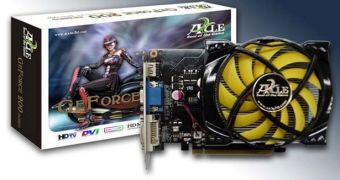Just after finally releasing its own Radeon HD 5970 ultra-high-end graphics card, Axle came out with its release of the NVIDIA-powered GT 240. Although not as powerful as the HD 5970 and with no overclocking possibilities to speak of, the card is a cheaper alternative to the heavy-weight ATI-powered beast while still offering high-end media playback and smooth gaming possibilities.
The GT 240 is capable of wonderful HD graphics rendering and virtually all games will find that this graphics card provides them with more than enough resources to run at maximum video and gameplay settings. This is accomplished by means of the integrated CUDA technology and the NVIDIA PhisX. The adapter itself works on 96 stream processors, each of which has a formidable clock speed of 1340MHz.
The GPU clock is set to run at a default speed of 550MHz and, in addition, the graphics card is outfitted with 32 Texture Filtering Units, 32 Texture Addressing Units and eight Rasper Operators (ROPs). Connectivity is assured by a set of HDMI, DVI and D-sub connectors, whereas the award-winning Arctic Cooling technology is used for heat-dissipation.
The adapter features the next-generation CUDA and PhysX technologies from NVIDIA. The PhysX easily implements real-life phenomena into games, such as fiery explosions, reactive debris and realistic water, not to mention the fact that it makes any and all game characters seem more lifelike.
Gaming is not all this card is good for, though. By means of the implemented GPU-Accelerated Video Transcoding, Image Editing and HD Video Playback, transcoding a video to an iPod, PSP or Zune is achievable at speeds up to ten times faster than a that of a CPU. In addition, image processing is smooth, fast and seamless through support for Adobe Photoshop CS4.
To sum up, the Axle GT 240 is an excellent choice for those who want immersion when gaming or seamless and fast playback of HD media but can't afford to acquire the performance-heavy and overclockable Radeon HD 5970.

 14 DAY TRIAL //
14 DAY TRIAL //